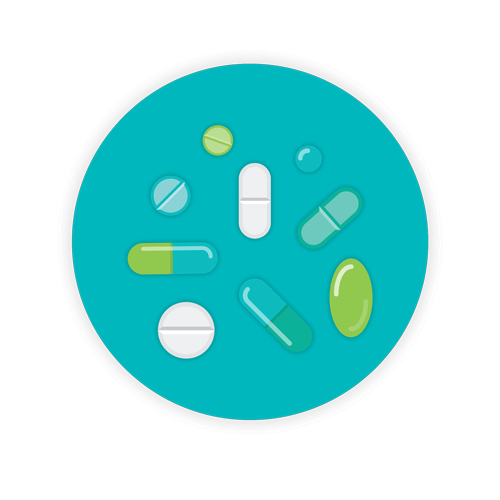Consequences of Improperly Disposed Pharmaceuticals

Daniels Health is big on waste segregation and identification of waste stream categories produced by any healthcare facility. Why? To protect you and your employees, the general public, and the environment!
One of the most potentially dangerous consequences of improperly disposed pharmaceuticals in regard to pharmaceutical waste is the danger to humans and animals. The consequences of improperly disposed pharmaceuticals are staggering to the environment.
When it comes to pharmaceutical disposal, improper habits of handling, storage, and disposal hazards within the workplace contribute to environmental harm and other safety hazards. This goes for medical facilities as well as home-based pharmaceutical disposal.
Do you know someone who has admitted to flushing their medications down the toilet? Chances are, you have.
TOPICS WE WILL COVER:
1 / Improperly Disposed Pharmaceuticals Increase Danger to Health and Environment
2 / Is there a Difference Between Non-Hazardous and Hazardous Pharmaceutical Waste?
3 / Consequences of Improper Pharmaceutical Disposal
4 / Fines for Improper Pharmaceutical Waste Disposal

Improperly Disposed Pharmaceuticals Increase Danger to Health and Environment
Improper medical waste disposal, including pharmaceutical waste, poses dangers to the environment such as water pollution. According to an article in the Journal of American Veterinary Medical Association (and yes, improperly disposed pharmaceuticals occur in all fields of practice in healthcare, including human and animal care) a number of pharmaceuticals as well as components produced by their deterioration find their way into lakes and rivers from wastewater treatment plants. Where do they end up? In crop fields and livestock farms. They can even leech out from septic systems and landfills.
It’s not just about microbes and nutrient content of rivers and lakes around the country from single types of pharmaceutical waste, but the combination of dangerous pharmaceuticals that are disposed of improperly that pose the greatest risk.
As a result, the Environmental Protection Agency (EPA) is diligently cautioning and reminding healthcare facilities, from hospitals to veterinary clinics to home users, not to flush any type of hazardous waste down the drains. In fact, the final draft of such a proposal to ban this practice was published by the EPA in February, which effectively “prohibits healthcare facilities from disposing of unused hazardous-waste pharmaceuticals by flushing or pouring down the drain into sewer systems.”
Is there a Difference Between Non-Hazardous and Hazardous Pharmaceutical Waste?
The importance of training when it comes to waste segregation cannot be overemphasized or underestimated in any healthcare facility. All employees should be trained in proper waste segregation as well as waste stream identification. That also applies to pharmaceutical waste. And yes, there is a difference between non-hazardous pharmaceutical waste and hazardous pharmaceutical waste.
For example, hazardous pharmaceutical waste can be classified in two ways:
- A pharmaceutical drug that has an EPA waste code
-
The pharmaceutical in question is either ignitable, corrosive, toxic, or reactive.
What about non-hazardous pharmaceutical waste? Non-hazardous pharmaceutical waste does not meet either federal or state regulations in regard to four primary characteristics: ignitable, corrosive, toxic, or reactive. Such pharmaceuticals also do not have an EPA-generated waste code. Some examples (not a complete list) of non-hazardous pharmaceutical waste include:
- Contaminated or damaged containers
- Expired pharmaceuticals
- Loose pills
- Patient medication left at the hospital upon discharge
-
Manufacturer samples
The Environmental Protection Agency provides relevant and timely information regarding management of pharmaceutical hazardous waste. Documents contained on the EPA website include information and guidance on a variety of situations that include pollution prevention as well as compliance assistance information for the healthcare industry.
The EPA also provides relevant documents for compliant pharmaceutical collection and disposal as well as their recommendations for hospitals, pharmacies, and other businesses that end up with unwanted medicines.
Daniels Health also stresses to clients that pharmacies, hospitals, or any other type of similar facilities that generate pharmaceutical waste are typically not allowed to utilize take-back programs or other local events to dispose of unused, expired, or unwanted pharmaceuticals. Rather, such facilities are responsible - and mandated - to maintain compliance in appropriate healthcare waste management in accordance with federal, state, and local environmental regulations.
Consequences of Improper Pharmaceutical Waste Disposal
- The consequences of improper pharmaceutical waste disposal are vast and alarming. Improper disposal of pharmaceutical waste has a huge hazard potential if it contributes to contamination of water supplies for wildlife.
- Expired drugs have the potential of getting into the wrong hands of the public, children, as well as animals.
- Contamination of drinking water sources by pharmaceutical waste affects aquatic as well as mammals drinking that water. Oh, let’s not forget the humans drinking it either.
- Non-biodegradable antibiotics, disinfectants, or chemotherapy drugs known as antineoplastic drugs that end up in sewage systems have the potential to kill bacteria required for sewage treatment. Antineoplastic drugs also have the potential to contaminate drinking water and endanger aquatic life. The same is applicable to many disinfectants.
- Proper and compliant incineration methods are beneficial, though burning pharmaceuticals in open containers or at low temperatures releases toxins into the air.
-
Improper destruction or disposal of pharmaceuticals promotes illegal activities such as resale or diversion of such drugs, even those that are expired and make their way into the general public.

Let's Not Forget the Fines for Improper Pharmaceutical Waste Disposal
In addition to the very real risk of massive fines and penalties for improper disposal of pharmaceutical waste, a healthcare facility, pharmaceutical company, laboratory, or anyone else dealing with potentially hazardous pharmaceuticals can face loss of reputation and even licensing in the event of improper pharmaceutical waste disposal.
Fines are no laughing matter. In January 2019, a Wisconsin hospital was fined $360,000 for pharmaceutical waste violations. Facilities often face fines and penalties not only from the federal governmental agencies, but state agencies as well. Among the infractions included in this particular fine was failure to provide hazardous waste training for personnel, failure to properly identify hazardous waste, and improperly recording, marking, and labeling of hazardous waste.
EPA fines for non-compliance in pharmaceutical waste disposal range anywhere from $10,000-$25,000 per violation, per day. The facility that breaks transportation rules when it comes to pharmaceutical waste can be fined up to $15,000 per violation by the Department of Transportation (DOT).
Fines for hazardous waste non-compliance overseen by the Resource Conservation and Recovery Act (RCRA) have increased maximum civil penalties for a single violation from $37,500 per day, per violation to $70,117 per day, per violation.
Follow the Rules
Environmental protection is important. Daniels Health has dedicated itself to sustainability, CO2 emissions reduction, reduced carbon footprint, and cost-effective disposal methods when it comes to healthcare waste management. We provide in-depth resources for medical waste generators of all sizes throughout the country and focus not just on federal guidelines, but state-by-state guidelines as well. For more information on how Daniels Health can help you maintain compliance while initiating cost-effective strategies to minimize medical waste disposal, contact us today.
SPEAK TO AN EXPERT 855 251 2655
